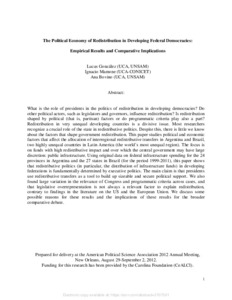Por favor, use este identificador para citar o enlazar este ítem:
https://repositorio.uca.edu.ar/handle/123456789/17096| Título: | The political economy of redistribution in developing federal democracies : empirical results and comparative implications | Autor: | González, Lucas Isaac Mamone, Miguel Ignacio Bovino, Ana |
Palabras clave: | ECONOMIA POLITICA; REDISTRIBUCION; FEDERALISMO; DEMOCRACIA; PAISES EN DESARROLLO; ESTADO; INFRAESTRUCTURA; FINANZAS PUBLICAS; POLITICA COMPARADA | Fecha de publicación: | 2012 | Editorial: | American Political Science Association | Cita: | González, L. I., Mamone, M. I., Bovino, A. The political economy of redistribution in developing federal democracies : empirical results and comparative implications [en línea]. En: APSA 2012 Annual Meeting : 29 de agosto al 2 de september. Nueva Orleans : American Political Science Association, 2012. Disponible en: https://repositorio.uca.edu.ar/handle/123456789/17096 | Resumen: | Resumen: What is the role of presidents in the politics of redistribution in developing democracies? Do other political actors, such as legislators and governors, influence redistribution? Is redistribution shaped by political (that is, partisan) factors or do programmatic criteria play also a part? Redistribution in very unequal developing countries is a divisive issue. Most researchers recognize a crucial role of the state in redistributive politics. Despite this, there is little we know about the factors that shape government redistribution. This paper studies political and economic factors that affect the allocation of interregional redistributive transfers in Argentina and Brazil, two highly unequal countries in Latin America (the world’s most unequal region). The focus is on funds with high redistributive impact and over which the central government may have large discretion: public infrastructure. Using original data on federal infrastructure spending for the 24 provinces in Argentina and the 27 states in Brazil (for the period 1999-2011), this paper shows that redistributive politics (in particular, the distribution of infrastructure funds) in developing federations is fundamentally determined by executive politics. The main claim is that presidents use redistributive transfers as a tool to build up sizeable and secure political support. We also found large variation in the relevance of Congress and programmatic criteria across cases, and that legislative overrepresentation is not always a relevant factor to explain redistribution, contrary to findings in the literature on the US and the European Union. We discuss some possible reasons for these results and the implications of these results for the broader comparative debate. | Cobertura Espacial: | Argentina Brasil América Latina |
URI: | https://repositorio.uca.edu.ar/handle/123456789/17096 | Disciplina: | CIENCIA POLITICA | Derechos: | Acceso abierto | Fuente: | APSA 2012 Annual Meeting : 29 de agosto al 2 de september. Nueva Orleans : American Political Science Association, 2012 |
| Aparece en las colecciones: | Artículos |
Ficheros en este ítem:
| Fichero | Descripción | Tamaño | Formato | |
|---|---|---|---|---|
| political-economy-redistribution.pdf | 195,55 kB | Adobe PDF |  Visualizar/Abrir |
Visualizaciones de página(s)
35
comprobado en 27-abr-2024
Descarga(s)
16
comprobado en 27-abr-2024
Google ScholarTM
Ver en Google Scholar
Este ítem está sujeto a una Licencia Creative Commons

